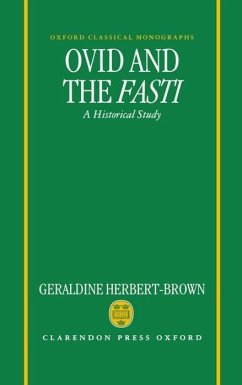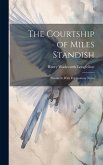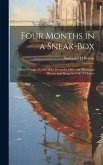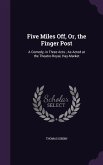Despite the death of contemporary witnesses for the late Augustan and early Tiberian Principates, Ovid's Fasti has remained curiously neglected as an historical source for the period. The aim of this new research is to show that the poem of some five thousand lines on the Roman calendar, written and revised in the years between AD 4-16, provides students of the Augustan age with a wealth of information, both about the author himself, and about his cultural and political environment. The author discovers important new insights into the way in which Augustus and his family were incorporated into the ancient religion of the city of Rome, and reveals Ovid as a unique contemporary witness of the last decade of Augustus' life and the first years of Tiberius' rule. From his poem the Fasti, Dr Herbert-Brown finds new evidence of the processes which marked the transition from the Republic to Empire.
Despite the dearth of contemporary witnesses for the late Augustan and early Tiberian Principates, Ovid's Fasti has remained curiously untapped as a historical source for the period. The aim of this new research is to show that the poem of some five thousand lines on the Roman calendar, written and revised in the years between AD 4 and 16, provides students of the Augustan age with a wealth of information, both about the author himself, and about his cultural and political environment. Dr Herbert-Brown investigates the purpose of the poem and examines the options available to a love-elegist who wished to adapt his talents to the service of the late Augustan regime. She illustrates how Ovid's calendar discloses important new insights into the ways in which Augustus and his family were incorporated into the ancient religion of the city of Rome. She reveals the author of the Fasti to be a unique contemporary observer of the processes which marked the transition from State cult to Ruler cult, and of the parallel evolution from Republic to Empire.
Hinweis: Dieser Artikel kann nur an eine deutsche Lieferadresse ausgeliefert werden.
Despite the dearth of contemporary witnesses for the late Augustan and early Tiberian Principates, Ovid's Fasti has remained curiously untapped as a historical source for the period. The aim of this new research is to show that the poem of some five thousand lines on the Roman calendar, written and revised in the years between AD 4 and 16, provides students of the Augustan age with a wealth of information, both about the author himself, and about his cultural and political environment. Dr Herbert-Brown investigates the purpose of the poem and examines the options available to a love-elegist who wished to adapt his talents to the service of the late Augustan regime. She illustrates how Ovid's calendar discloses important new insights into the ways in which Augustus and his family were incorporated into the ancient religion of the city of Rome. She reveals the author of the Fasti to be a unique contemporary observer of the processes which marked the transition from State cult to Ruler cult, and of the parallel evolution from Republic to Empire.
Hinweis: Dieser Artikel kann nur an eine deutsche Lieferadresse ausgeliefert werden.








